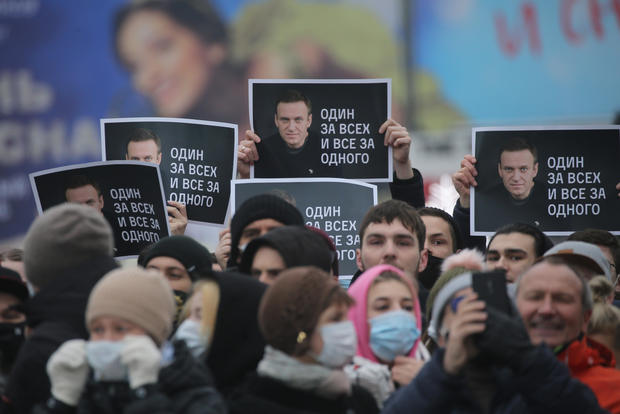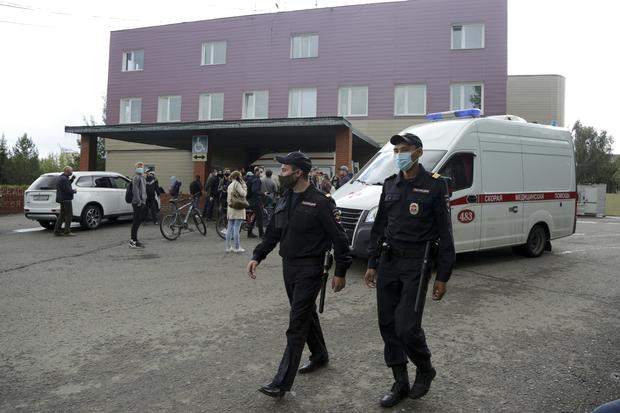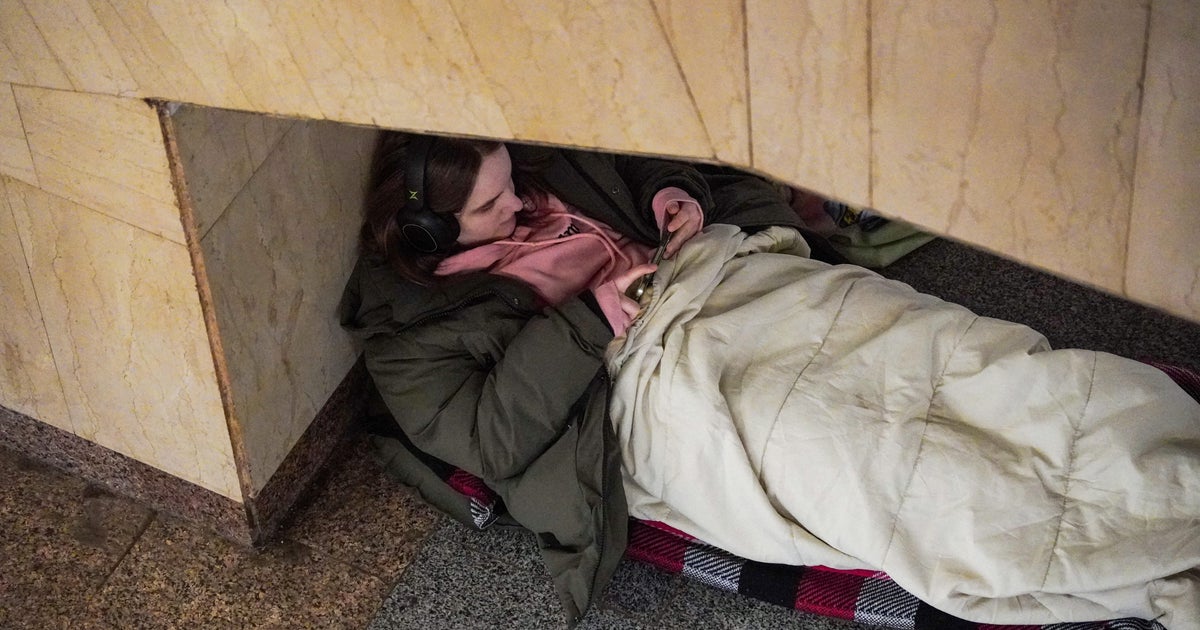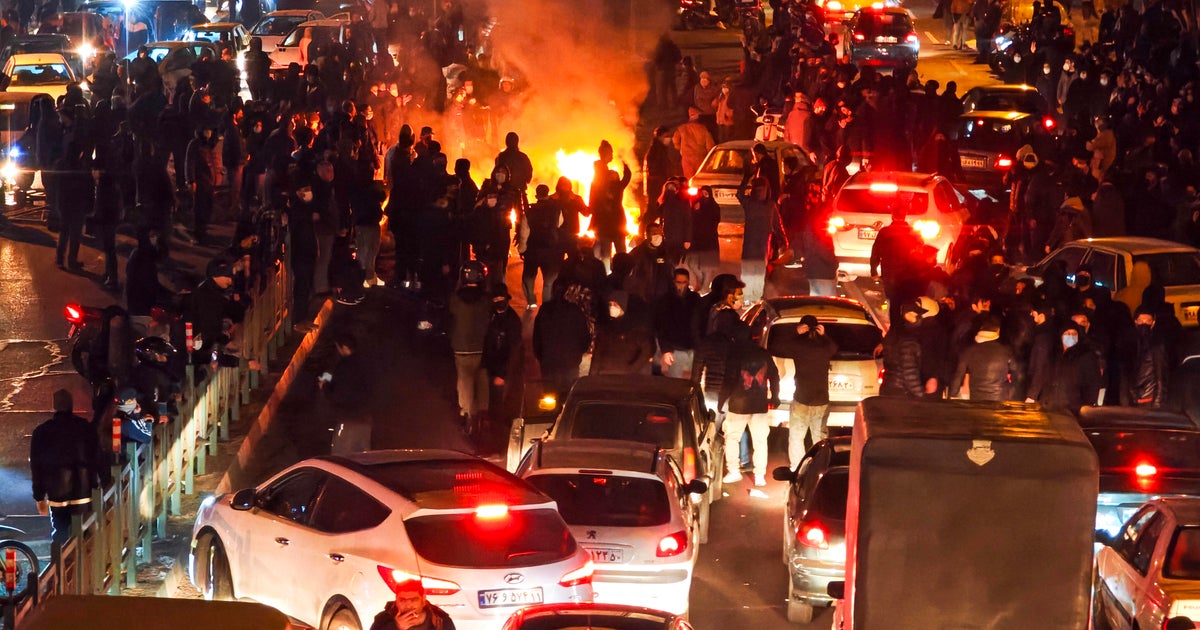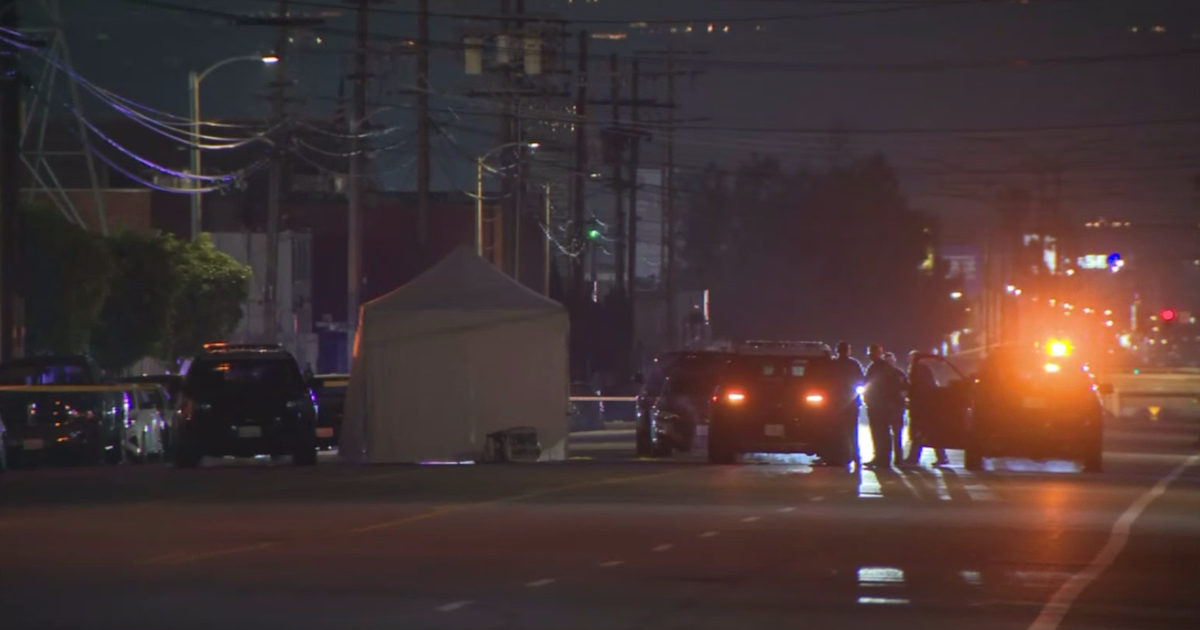Navalny's team halts protests as doctor who treated him dies, Russian jails overflow with his supporters
Moscow — Jailed Russian opposition leader Alexey Navalny appeared in a Moscow court on Friday for the second time this week as international pressure mounted on President Vladimir Putin's government to release its most prominent critic. Navalny, a long-time anti-corruption activist-turned politician, has fueled the most direct challenge to Putin's authority in the Russian leader's two decades in power.
So many of Navalny's supporters have been rounded up by police at recent protests calling for his release, that Russian jails are running out of room to detain them.
Navalny, 44, was arrested on January 17 immediately upon his return from Germany, where he spent five months recovering from poisoning with the Soviet-era nerve agent Novichok. On Tuesday he was jailed for nearly three years for violating the terms of a 2014 suspended sentence for fraud, a case he has always dismissed as politically motivated.
The opposition leader was back in court on Friday to face a separate charge of defaming a 95-year-old WWII veteran who appeared in a pro-Putin video that Navalny criticized in a tweet. He pleaded not guilty, but if he's convicted of the libel charge he could face a fine or community service, on top of his current jail term.
Russia's jails are overflowing
Russian security services detained more than 11,000 people at pro-Navalny rallies on two straight weekends last month and demonstrations in Moscow and St. Petersburg on Tuesday, when he was handed his prison sentence.
Many of those arrested have complained of harsh conditions in custody, and even torture by the police.
One of the detainees, Dmitry Ivanov, posted a photo on Thursday of his crowded jail cell to his channel on the Telegram social media app. He was among 28 people crammed into the cell designed to hold eight.
A video posted online by other detainees this week showed people jammed into a police bus. Many said they had been held on the bus for hours, sometimes days, with no access to food, water or bathroom facilities. Human rights activists said that as Moscow's jails filled up, hundreds of detainees were driven to facilities miles away from the city.
Aleksandra Bayeva, a coordinator with the OVD-Info rights group that has monitored arrests in Russia since 2011, told CBS News that lawyers — and even relatives hoping to provide food, water and medication - have in many cases been denied access to the detainees.
"We have never registered so many detentions," Bayev told CBS News on Friday. "But we also have never recorded so much cruelty… so much aggression."
Protests on ice
Navalny's team has decided to stop calling for new protests in support of the opposition leader until at least the spring, according to Leonid Volkov, a senior aide to the imprisoned Kremlin critic.
"If we take to the streets every week, we will get thousands more arrested and hundreds more beaten," Volkov, a self-exiled activist, said during a YouTube live stream on Thursday evening. He urged the opposition to focus instead on campaigning for parliamentary elections set to take place this fall.
Volkov said Navalny's allies would continue to push for the politician's release by increasing international pressure on Russia.
"No world leader will talk to Putin about anything other than Alexey Navalny and his release," Volkov said.
Kremlin spokesman Dmitry Peskov quickly seized the opportunity to push the narrative that the internal opposition was really a foreign-fueled plot to overthrow Putin's government.
He called Volkov's remarks "a complete demonstration of the status of a foreign agent."
Russian officials have often claimed that Navalny and his associates are backed by foreign intelligence.
In a written statement from jail released online on Wednesday, Navalny appealed to his supporters to resist "intimidation" by the authorities.
"By fighting our fear, we can liberate our Motherland from the little band of thieves and occupiers. And we will do this," he said.
No more "rolling over" for Russia?
U.S. President Joe Biden, delivering a speech on foreign policy Thursday at the State Department in Washington, said the United States would no longer be "rolling over in the face of Russia's aggressive actions," and he reiterated a U.S. demand for Navalny's immediate release.
"The Russian efforts to suppress freedom of expression and peaceful assembly are a matter of deep concern to us and the international community," Mr. Biden said.
The Kremlin called his remarks "aggressive and unconstructive rhetoric."
"Notes of some kind of ultimatum are generally unacceptable for us, we have already said that we will not heed such statements," Peskov told reporters on a Friday conference call.
As Thursday's hearing took place, the European Union's foreign affairs chief Josep Borrell visited Moscow for talks with his Russian counterpart, Foreign Minister Sergei Lavrov.
Borrell said Navalny's detention had plunged the EU's already-strained relations with Russia to a new "low point". The EU envoy said he had spoken with Lavrov about Europe's deep concern over Navalny's detention and reiterated the bloc's call for his release, as well as an independent investigation into his poisoning.
Not long after, Russia announced that it was expelling three diplomats from Sweden, Poland and Germany for attending protests in support of Navalny.
Doctor who treated Navalny dies
The EU, along with the United Nations and many other governments have called for months for an independent investigation into Navalny's poisoning. The opposition leader told CBS' "60 Minutes" last year that he was certain Putin himself had ordered the attack on him, and that he was poisoned in a hotel in Russia. The Kremlin has denied any involvement in a poisoning.
Navalny first fell ill on a domestic flight in August. The plane made an emergency landing and he was admitted to a hospital in the city of Omsk, in Russia's northern Siberia region. For several days his family and associates fought to have him flown to Germany for emergency treatment, but were blocked by Russian officials.
He was eventually flown to Germany and spent 32 days in Berlin's Charité hospital, most of them in intensive care.
On Thursday, an obituary was posted on the web page of Omsk City Hospital No. 1 for Dr. Sergei Maksimishin, 55, who was in charge of Navalny's treatment in the days after he first became ill.
The hospital did not list a cause of death, but a local media outlet cited the regional health care ministry as saying he died of a heart attack.
"The man was sick. He died at work, in his intensive care unit, where he worked," the ministry reportedly said.
